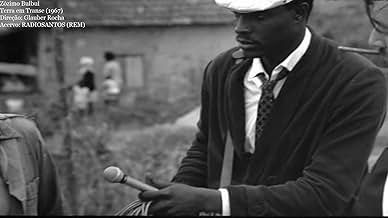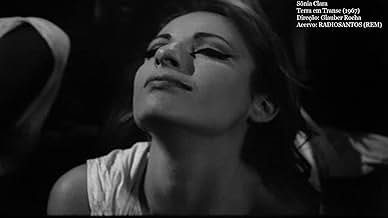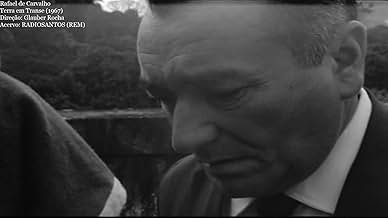VALUTAZIONE IMDb
7,3/10
3828
LA TUA VALUTAZIONE
In un fittizio paese dell'America Latina chiamato Eldorado, un poeta prova a portare un cambiamento politico, tentando di influenzare uomini importanti.In un fittizio paese dell'America Latina chiamato Eldorado, un poeta prova a portare un cambiamento politico, tentando di influenzare uomini importanti.In un fittizio paese dell'America Latina chiamato Eldorado, un poeta prova a portare un cambiamento politico, tentando di influenzare uomini importanti.
- Regia
- Sceneggiatura
- Star
- Premi
- 2 vittorie e 1 candidatura in totale
Jofre Soares
- Father Gil
- (as Joffre Soares)
Thelma Reston
- Felício's wife
- (as Telma Reston)
Emmanuel Cavalcanti
- Felício
- (as Emanuel Cavalcanti)
Recensioni in evidenza
Released on Mr Bongo in 2005 "Terra em Transe" is dated, and has a confused screenplay, although being magnificently updated regarding the lack of ethics and the amoral behavior of the politicians. If the reader has had the opportunity of reading Machiavelli's "The Prince", you'll probably see how the behavior of politicians remains unchanged along the centuries.
However, keeping in mind that in this is movie Brazil was under a tough military dictatorship, this movie is a milestone in the history of Brazilian New Cinema. Glauber Rocha was very braze, discussing forbidden themes such as fight of classes, manipulation of the submissive masses by the elites, corruption in politician, anarchism, campaign promises not kept after the elections, economical power of foreign groups (or countries) in Latin American countries and coup d'état. In 1967, "Terra em Transe" was awarded with "Great Prize" in the Locarno Festival (Switzerland); "Luis Buñuel Prize" in Cannes Festival; "Federation of International Critics Prize" in Cannes Festival; and Best Movie of the Year in the Air France Prize, among other prizes
However, keeping in mind that in this is movie Brazil was under a tough military dictatorship, this movie is a milestone in the history of Brazilian New Cinema. Glauber Rocha was very braze, discussing forbidden themes such as fight of classes, manipulation of the submissive masses by the elites, corruption in politician, anarchism, campaign promises not kept after the elections, economical power of foreign groups (or countries) in Latin American countries and coup d'état. In 1967, "Terra em Transe" was awarded with "Great Prize" in the Locarno Festival (Switzerland); "Luis Buñuel Prize" in Cannes Festival; "Federation of International Critics Prize" in Cannes Festival; and Best Movie of the Year in the Air France Prize, among other prizes
"Terra em Transe" (in Portuguese, "Terra" means "Land"; "Transe" has quite some meanings, like "Anguish", "Risk", "Trance", "Transience") is Glauber Rocha's most important film along with his earlier masterpiece "Deus e o Diabo na Terra do Sol" (1964). In "Terra", we see best his cinematic assets (boldness, experimentalism, confrontational non-conformity, red-blooded vibrancy, great and original visual style) and faults (grandiloquence, contradictoriness, verbosity, technical shortages). The main character of the film is his own country, Brazil, and by extension Latin America, amalgamated into the fictional country of Eldorado (the mythical South American dreamland pursued by European explorers in the 16th and 17th centuries).
The films uses avant-garde, fragmented, non-chronological narration and editing because we are witnessing the random thoughts and memories of a dying man (though this is not clear until half-way into the film). That man is the "Artist", Paulo Martins (Jardel Filho at his best), a poet (hence capable of transcending immediacy, materialism and greed) and journalist (hence a man of his time, capable of connecting to reality). Paulo is caught in a paralyzing personal, political and ethical crisis: what's the role of Art and Artists (especially cinema and filmmakers) in the Third World in the 1960s? Apparently, to serve as a sort of Socratic "light" (ethically, sociologically, politically) against the obscurantist, alienating praxis of "Imperialist domination" in Latin America, since movies are a mass media more accessible to the public than theater, books, theses, specialized essays -- movies CAN reach poor, illiterate people. But artists should be aware they're paying a big personal price for their commitment with the "cause" (leftist cause, as it were).
The film poses a series of bold, difficult questions: why is political corruption ubiquitous and endemic in Latin America? Why and how do fascist leaders get legally elected? Why do fascist leaders always fascinate the "masses"? Is it because they speak what people want to hear or is it their power that fascinates people? Why are Latin fascists always connected with the Catholic Church? Is a demagogue better than a fascist? Are the "ignorant, unprepared working classes" ready to take power in their own hands? Do the "masses" want power to promote equality or do they aspire for the privileges of power? Once in power, will they turn down those privileges for the sake of a new political ethics? Is armed revolution more efficient than gradual conquest of civil and legal rights? Is any model of revolution "importable" (from the USSR, Cuba, etc)? Can the "new society" really be less autocratic and corrupt than the "old" one? No easy answers available, but good questions.
"Terra em Transe" is feverish, urgent, frantic, but not preachy or self-righteous: it's uncompromisingly dialectical and that's one of its best qualities. It's the work of a lucid, angst-filled, courageous 28 year-old filmmaker trying to think out the socio-political complexity of his own country and times, trying to make a contribution as an artist. Glauber boldly confronted censorship with his clear allusions to Brazilian military regime and the "subversive" revolutionary counter-actions that were beginning to take shape in 1967 and would explode in 1969 through the mid-1970s. The military censors vetoed the exhibition and distribution of "Terra...", eventually liberated because it was invited to compete at Cannes (where it won 2 prizes) and Locarno (where it triumphed as Best Film) and the military feared a negative international repercussion of the affair.
Some critics complained the film was incomprehensible and too allegoric; but the fact is that Brazil had gotten so complex by the late 60s that no simple traditional narrative could suffice. Glauber employs the Brechtian concept of building characters as archetypes behaving not as individuals but as symbols of their social class, origins and interests. Cinematically, the film was influenced by the Soviet revolutionary "montage" of Einsenstein/Dovzhenko, the French avant-garde of Vigo and Godard, the cinéma-vérité of Rouch, the unbound creative freedom of Buñuel. Dib Lutfi's hand-held camera is mesmerizing, dizzying, practically having a life of its own (and probably influenced by the outstanding Soviet cameramen Urusevsky and Calzatti). Luiz Carlos Barreto's bleached lighting creates diffuse backgrounds and unspecific landscapes of the invented "Eldorado" (and also helped solve budget limitations concerning locations). The all- star cast is committed and vital, acting at the top of their lungs -- Glauber was no fan of understatement or subtlety:)) The only terrible, embarrassing performance is that of non-actress socialite Danuza Leão, whose dialogs were all cut in post-production -- she poses here as a mute beauty.
Made as a fiction film, "Terra..." is also a testimony of the tense shift that Brazil (and the world) was going through in the mid-60s: utopia was breathing her last bittersweet breath. Today, "Terra..." can be seen both as a fiction film AND a historical document, despite (or because of) the fact that it's extremely symbolic, poetic, anti-naturalistic. Suddenly, you're aware of a time in History when a film -- a popular medium of artistic expression! -- was not afraid to raise and discuss political theses or use words like "patriarchalism", "imperialism", "conolialism", "masses" or "revolution" in dialog! To 21st century politically sanitized/fed-up audiences, "Terra..." can be quite an experience. Rocha's daring, confrontational, neck-gripping, thick-blooded art towers over the hordes of predictable, intellectually flaccid, ideologically boneless films of the 2000s.
This is compulsory viewing for anyone interested in Glauber Rocha and/or Brazilian/Latin-American political cinema. It can be confusing, loud and chaotic at times, but it's highly impacting and, most importantly, it urges you to think. It's a good companion piece to key "revolution" films of the mid-60s such as Rocha's own "Deus e o Diabo ...", Ruy Guerra's "Os Fuzis", Alea's "Memorias del Subdesarrollo", Solana's "La Hora de los Hornos", Bertolucci's "Prima della Revoluzione", Pasolini's "Uccellacci e Uccellini", Godard's "Le Petit Soldat", Pontecorvo's "La Battaglia di Algeri", Kalatozov's "Soy Cuba", etc (the list goes on and it's a GREAT list!). Don't watch it if you're not into political art or dislike experimental film-making.
The films uses avant-garde, fragmented, non-chronological narration and editing because we are witnessing the random thoughts and memories of a dying man (though this is not clear until half-way into the film). That man is the "Artist", Paulo Martins (Jardel Filho at his best), a poet (hence capable of transcending immediacy, materialism and greed) and journalist (hence a man of his time, capable of connecting to reality). Paulo is caught in a paralyzing personal, political and ethical crisis: what's the role of Art and Artists (especially cinema and filmmakers) in the Third World in the 1960s? Apparently, to serve as a sort of Socratic "light" (ethically, sociologically, politically) against the obscurantist, alienating praxis of "Imperialist domination" in Latin America, since movies are a mass media more accessible to the public than theater, books, theses, specialized essays -- movies CAN reach poor, illiterate people. But artists should be aware they're paying a big personal price for their commitment with the "cause" (leftist cause, as it were).
The film poses a series of bold, difficult questions: why is political corruption ubiquitous and endemic in Latin America? Why and how do fascist leaders get legally elected? Why do fascist leaders always fascinate the "masses"? Is it because they speak what people want to hear or is it their power that fascinates people? Why are Latin fascists always connected with the Catholic Church? Is a demagogue better than a fascist? Are the "ignorant, unprepared working classes" ready to take power in their own hands? Do the "masses" want power to promote equality or do they aspire for the privileges of power? Once in power, will they turn down those privileges for the sake of a new political ethics? Is armed revolution more efficient than gradual conquest of civil and legal rights? Is any model of revolution "importable" (from the USSR, Cuba, etc)? Can the "new society" really be less autocratic and corrupt than the "old" one? No easy answers available, but good questions.
"Terra em Transe" is feverish, urgent, frantic, but not preachy or self-righteous: it's uncompromisingly dialectical and that's one of its best qualities. It's the work of a lucid, angst-filled, courageous 28 year-old filmmaker trying to think out the socio-political complexity of his own country and times, trying to make a contribution as an artist. Glauber boldly confronted censorship with his clear allusions to Brazilian military regime and the "subversive" revolutionary counter-actions that were beginning to take shape in 1967 and would explode in 1969 through the mid-1970s. The military censors vetoed the exhibition and distribution of "Terra...", eventually liberated because it was invited to compete at Cannes (where it won 2 prizes) and Locarno (where it triumphed as Best Film) and the military feared a negative international repercussion of the affair.
Some critics complained the film was incomprehensible and too allegoric; but the fact is that Brazil had gotten so complex by the late 60s that no simple traditional narrative could suffice. Glauber employs the Brechtian concept of building characters as archetypes behaving not as individuals but as symbols of their social class, origins and interests. Cinematically, the film was influenced by the Soviet revolutionary "montage" of Einsenstein/Dovzhenko, the French avant-garde of Vigo and Godard, the cinéma-vérité of Rouch, the unbound creative freedom of Buñuel. Dib Lutfi's hand-held camera is mesmerizing, dizzying, practically having a life of its own (and probably influenced by the outstanding Soviet cameramen Urusevsky and Calzatti). Luiz Carlos Barreto's bleached lighting creates diffuse backgrounds and unspecific landscapes of the invented "Eldorado" (and also helped solve budget limitations concerning locations). The all- star cast is committed and vital, acting at the top of their lungs -- Glauber was no fan of understatement or subtlety:)) The only terrible, embarrassing performance is that of non-actress socialite Danuza Leão, whose dialogs were all cut in post-production -- she poses here as a mute beauty.
Made as a fiction film, "Terra..." is also a testimony of the tense shift that Brazil (and the world) was going through in the mid-60s: utopia was breathing her last bittersweet breath. Today, "Terra..." can be seen both as a fiction film AND a historical document, despite (or because of) the fact that it's extremely symbolic, poetic, anti-naturalistic. Suddenly, you're aware of a time in History when a film -- a popular medium of artistic expression! -- was not afraid to raise and discuss political theses or use words like "patriarchalism", "imperialism", "conolialism", "masses" or "revolution" in dialog! To 21st century politically sanitized/fed-up audiences, "Terra..." can be quite an experience. Rocha's daring, confrontational, neck-gripping, thick-blooded art towers over the hordes of predictable, intellectually flaccid, ideologically boneless films of the 2000s.
This is compulsory viewing for anyone interested in Glauber Rocha and/or Brazilian/Latin-American political cinema. It can be confusing, loud and chaotic at times, but it's highly impacting and, most importantly, it urges you to think. It's a good companion piece to key "revolution" films of the mid-60s such as Rocha's own "Deus e o Diabo ...", Ruy Guerra's "Os Fuzis", Alea's "Memorias del Subdesarrollo", Solana's "La Hora de los Hornos", Bertolucci's "Prima della Revoluzione", Pasolini's "Uccellacci e Uccellini", Godard's "Le Petit Soldat", Pontecorvo's "La Battaglia di Algeri", Kalatozov's "Soy Cuba", etc (the list goes on and it's a GREAT list!). Don't watch it if you're not into political art or dislike experimental film-making.
Although this film is not so perfect as it is normally stated, it is a very important film neverthless. In Brazil, it's usually a case of "love it or hate it" as regards to this film. It may not be perfect, but it is impressive, and shows efficiently political corruption and the degradation of one's soul as well. Although somewhat confused in some moments, the film is packed with great scenes, and is always visually impressive. It also had the merit of discussing Brazil's problems at the time, using fictional "Eldorado" as a shield against the strong censorship applied in these days. Has it's place guaranteed in brazilian cinerama.
While watching this, I kept on going back and forth between a 4 and a 4.5 before I finally settled on a 4.5. Like Rocha's "Black God, White Devil", which I watched a year or two ago, I didn't quite follow everything which went on and somewhat struggled to keep up with the plot. The more of this I watched, however, the more impressed I was with various stylistic touches such as the narration taking on a ghostly feel (the camerawork helps in that regard), various scenes appearing to occur in between Paulo's head and reality, and the film maintaining a dream-like atmosphere at numerous points. The film also captures the blindness of the masses towards accepting the false promises of political figures, and how this blind faith is a pattern which repeats itself over and over again. Thematically, it's interesting, but stylistically, it hits a number of my sweet spots really well and I definitely intend on rewatching it later this year to see if my appreciation of it goes up or down.
I know that most people will consider this opinion as heretics, but I think this a bad movie. Despite the good cinematography and the many great actors. The script is an undevelopped and confusing mess, partially in a hurry, partially simply shallow, exceding in its chaotic expressionist improvisation. It is pretensious but lacks deepness and a more sophisticated social political critique. Dialogs are just bad. Technically, sound is also quite flawed. Edition is unjustifiably harsh sometimes, with abrupt cuts. Many scenes are partially documental, as they were shot with few actors and many extras who were indeed common people who ignored that the situation was fictious (it may work but is moral questionable). The only really good part is the small segment in which there is a kind of mockumentary about Porfirio Diaz. To resume, "Enhanced earth" is world-wide celebrated but seriously overrated.
Lo sapevi?
- QuizEldorado is a fictional country. It's entirely based on political and social issues of Brazil after 1964 while the country was under a military dictatorship that was over only in 1985.
- Citazioni
Felipe Vieira: The streets belong to the people, like the sky belongs to the condors.
- ConnessioniFeatured in Improvisiert und zielbewusst (1967)
- Colonne sonoreOtello: Overture
Music by Giuseppe Verdi
I più visti
Accedi per valutare e creare un elenco di titoli salvati per ottenere consigli personalizzati
- How long is Entranced Earth?Powered by Alexa
Dettagli
- Tempo di esecuzione1 ora 48 minuti
- Colore
- Mix di suoni
- Proporzioni
- 1.66 : 1
Contribuisci a questa pagina
Suggerisci una modifica o aggiungi i contenuti mancanti

Divario superiore
By what name was Terra in trance (1967) officially released in India in English?
Rispondi





























